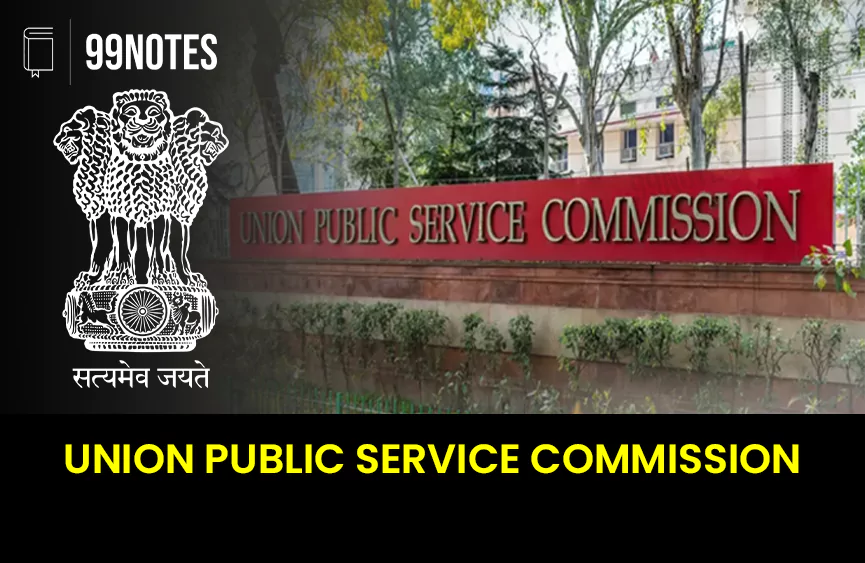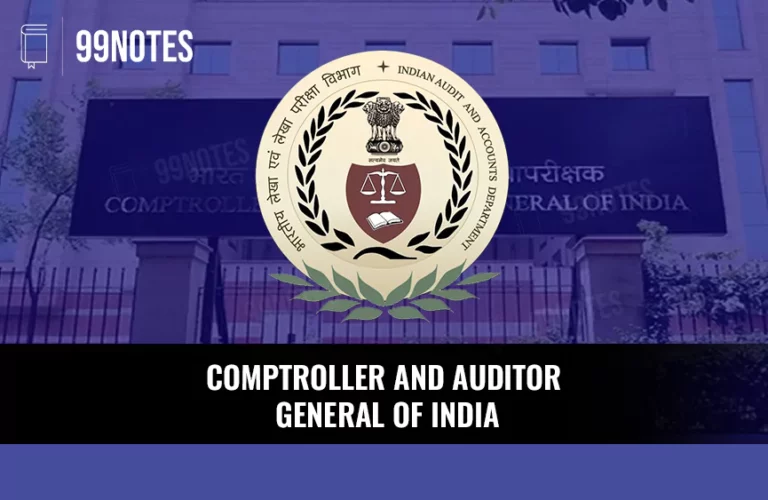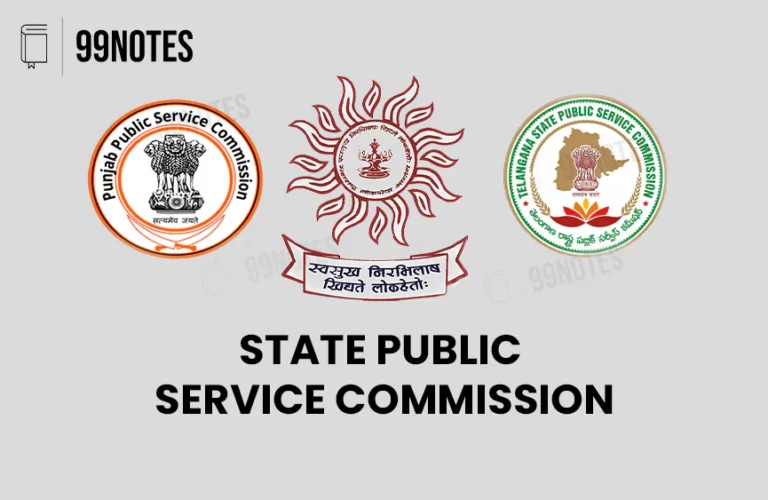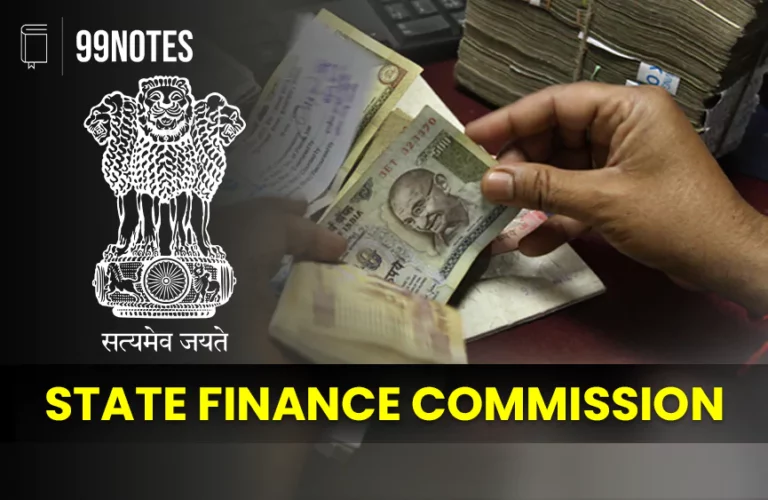Union Public Service Commission (UPSC)
UPSC
In a democratic government, civil service is a crucial institution responsible for assisting the political executive in the country’s governance. The task of selecting the right individual to be recruited for the country’s highest service is vested in the Union Public Service Commission (UPSC).
UPSC is an independent constitutional body formed under Article 315 for recruiting civil servants at the central level. Articles 315 to 323 in Part XIV of the Constitution describe the composition, appointment and removal of members and various aspects related to independence, powers and functions of the UPSC.
The constitutional status of the Commission played a significant role as it could function without being influenced by political or other extraneous considerations. Therefore, it safeguards against any potential interference with the authority and ensures the independence of the Commission, either by the legislature or the executive.
Apart from the Constitution, UPSC derives its functions from other sources like the laws made by the Parliament, rules, regulations, orders of the executive, and conventions.
Historical Background of UPSC |
| ● In 1853, a competitive system was designed for the first time to select civil servants without any discrimination. A test was conducted in London each year for the purpose.
● However, Moderate leaders demanded an independent commission that could conduct the examination in India and be free from government influence. A resolution in the House of Commons was passed in 1893 for the same. ● Government of India Act, 1919: It proposed setting up the Federal Public Service Commission to recruit civil servants. ● Lee Commission (1924): The Commission recommended the creation of an impartial and independent Public Service Commission. As a result, in 1926, the Federal Public Service Commission was constituted. ● Government of India Act, 1935, finally provided for the Federal and Provincial Public Service Commission. |
Composition, Appointment and Tenure of UPSC Members
Composition and strength of UPSC
The constitution states that the chairman and ‘other’ members of the UPSC are to be appointed by the President of India. The total strength of the Commission is not specified in the Constitution, but it has been left to the discretion of the President.
- Strength: Currently, the sanctioned strength of UPSC is 10 members (excluding the chairman) as per UPSC (Members) Regulations, 1969. Usually, the Commission comprises nine to eleven members, including the Chairman. Currently, only seven members are appointed in UPSC.
- Qualification: No specific qualification is prescribed for the members of the Commission. However, the Constitution under Article 316 states that one-half of the members of the Commission should be such persons who have held office for at least ten years either under the Government of a state or the Government of India. (i.e. half of UPSC members are ex-civil servants)
- Appointment as acting chairman: The Constitution allows the President to appoint one of the members of UPSC as an acting chairman if:
-
- The office of Chairman falls vacant, or
- The Chairman is not able to perform his functions due to absence or any other reason.
The acting Chairman remains in office until the Chairman resumes his duties or any other person is appointed as Chairman.
Conditions of Service of UPSC Chairman Members:
- The condition of service of the Chairman and other members of the Commission is determined by the President.
- Tenure: The Chairman and members of the Commission can hold office for a term of six years or until they turn 65, whichever is earlier. However, they can renounce their offices by addressing their resignation to the President.
- Removal: The President can remove the Chairman and members of UPSC before the expiry of their term in the manner as provided in the Constitution.
Removal of UPSC Chairman and Members
The Chairman or any other member of UPSC can be removed from office by the President under the following circumstances:
- If he is adjudged insolvent (bankrupt);
- If, during his term of office, he engages in any paid employment outside the duties of his office or
- If, in the opinion of the President, he is unfit to continue in office by reason of infirmity of mind or body.
Removal for Misbehaviour
Additionally, the Chairman or any other member of UPSC can be removed by the President for misbehaviour. The Constitution states that the Chairman or any member of UPSC is deemed to be guilty of misbehaviour if he:
- Is interested in or connected with any contract or agreement made by the Government of India or the State Government or
- Engages in any way in the profit of such contract or agreement or any benefit arising from it otherwise than as a member and in common with other members of an incorporated company.
Procedure of removal on charges of misbehaviour:
- In such a case, the President has to refer the matter to the Supreme Court for an enquiry.
- After the enquiry, if the Supreme Court advises removal, then the President can remove the Chairman or a member.
- According to the Constitution, the advice tendered by the Supreme Court in this case is binding on the President.
- The President may also suspend the Chairman or a member of the UPSC pending an enquiry by the Supreme Court.
Ensuring Independence of UPSC
The following provisions in the Constitution ensure the independent and impartial functioning of the UPSC:
- Security of tenure: The President can remove the Chairman or a member of the UPSC from office only on the grounds mentioned in the Constitution (grounds stated above).
- Conditions of Service: The conditions of service of the Chairman or a member are determined by the President, but they cannot be varied to their disadvantage after appointment.
- Expenditure not subject to the vote of Parliament: The entire expenses, including the salaries, pensions and allowances of the Commission’s Chairman and members, are charged on the Consolidated Fund of India not subjected to a vote of Parliament.
- Chairman and members ineligible for reappointment: On the expiration of their term of office, the Chairman and members of UPSC are not eligible for reappointment to that office (Article 316). Therefore, they are ineligible for a second-term appointment.
- Prohibition to Chairman for further appointment: On ceasing to hold office (removal, resignation, retirement, etc.), the Chairman of UPSC is ineligible for further employment in the Government of India or a state (Article 319).
- Appointment of members only for certain posts: A member of UPSC (on ceasing to hold office) is qualified for appointment only as the Chairman of UPSC or a State Public Service Commission but not for any other position in the Government of India or a state (Article 319).
The purpose of the above provisions, as mentioned in points number 4, 5, and 6, is to insulate the Commission and its members from any possibility of being influenced by a lure of office or a threat of insecurity or any other reason.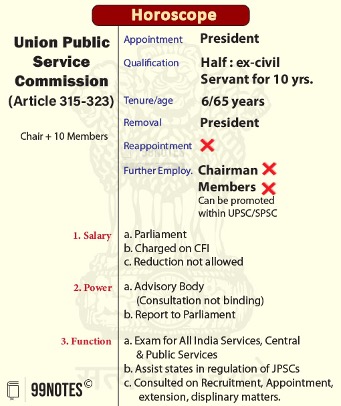
Functions of UPSC
The functions of the UPSC, as specified under Article 320 of the Constitution, are similar to those of the Federal Public Service Commission, as specified in the Government of India Act 1935.
These functions can be broadly classified into three categories:
1. Executive Functions of UPSC:
- Conducting examinations for appointment into various posts: It conducts examinations for appointments to various all-India services, Central services and other public services.
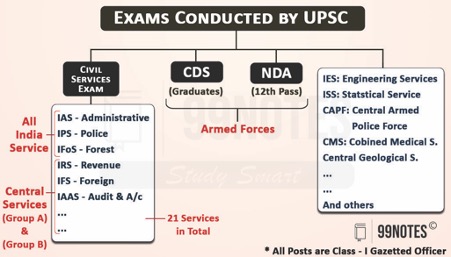
- Assist States for joint recruitment: It assists the states (if requested by two or more states) in framing and operating schemes for joint recruitment in any service that requires candidates possessing special qualifications.
- Serves need of State: On the request of the state governor and with the assent of the President of India, UPSC can serve all or any of the needs of a state
- Presentation of Report:
-
- It is the responsibility of the Commission to present annually to the President a report on the work done by the Commission.
- This report, along with the memorandum describing the action taken by the Government on the recommendations, is placed before the Parliament.
- Therefore, the Government is responsible for explaining the reasons in case the recommendations of the Commission are not accepted.
- The Appointments Committee of the Union cabinet must approve non-acceptance. An individual ministry or department cannot reject the advice of the UPSC.
- Conferment of Additional Functions:
-
- As per Article 321 of the Constitution, the Parliament can confer additional functions on UPSC pertaining to the services of the Union or the States.
- If necessary, the Parliament has the power to place the personnel system of any local authority, public institution or corporate body within the jurisdiction of the Commission.
2. Consultation Functions:
The Constitution states that the Government should consult the Commission on the following matters:
- All disciplinary actions affecting a government employee, like withholding of increments or promotion, censure, reduction to a lower grade, removal or dismissal from service, compulsory retirement,
- Claims for reimbursement of costs incurred by an employee in legal proceedings instituted against him for the acts done in the execution of his duty.
- Claims for the award of pension in connection with injuries sustained by an employee while serving under the Government.
- Matters related to making temporary appointments for periods exceeding one year and on regularisation of appointments.
- Matters related to extension of service and re-employment of certain retired civil servants.
- Any other matter concerning personnel management.
The Supreme Court has held that if the Government shows irregularity or fails to consult UPSC in the matters (discussed above), the aggrieved public servant has no remedy in court. Thus, the above provision is directory and not mandatory in nature. The court also ruled that a selection for a post by the UPSC does not confer any right upon the candidate. But the Government is expected to act fairly and without arbitrariness or mala fides.
3. Advisory Functions:
UPSC advises the Government in matters relating to:
- Methods of recruitment to civil services and
- The principles to be followed while making appointments, promotion and transfer from one service to another and appointments by transfer or deputation.
- UPSC can advise on disciplinary actions that can be taken against employees.
It is to be noted that the UPSC’s jurisdiction is purely advisory. According to Article 320 (3), it is the duty of the Commission to advise the Government on all matters relating to recruitment methods to civil services, promotions and transfers from post.
Also, UPSC cannot make regulations on personnel matters which are binding on all government departments.
Limitation of the Advisory function of UPSC
The main issue with UPSC’s advisory role is that its advice is not binding on the Government.
- Firstly, the Government is not obligated to accept the Commission’s advice. But a constitutional restraint is imposed on the non-acceptance of the Commission’s advice under Article 323.
- If the advice of the Commission is not accepted, the Government is required under Article 323 to place before the Parliament a memorandum explaining the reasons for such non-acceptance.
However, while dealing with the Commission’s advice, the power of the Ministry or Department has been deliberately restricted, due to which the advice cannot be rejected unless it has the approval of the Appointments Committee of the Cabinet. No administrative department can act against the advice of the Commission unless it has the concurrence of the Committee.
Central Vigilance Commission’s impact on UPSC’s role |
| The role of UPSC in disciplinary matters was affected after the emergence of the Central Vigilance Commission (CVC) in 1964.
While taking disciplinary action against a civil servant, both are consulted by the Government. But, the problem arises when conflicting advice is tendered. The UPSC has an edge over the CVC (a statutory body) as it has been an independent constitutional body. |
Limitations of the Functioning of UPSC
The following matters are placed outside the functional jurisdiction of the UPSC:
- While making reservations in appointments or posts for any backward class of citizens.
- While considering the claims of scheduled castes and scheduled tribes for making appointments to services and posts.
- While making selections for chairmanship or membership of commissions or tribunals, high-powered committees, highly technical and administrative posts, group C and group D services.
- While making the selection for temporary appointment to a post if the person appointed is not expected to hold the post for more than a year.
- President’s power for exclusion:
-
- The President has the power to exclude posts, services and matters from the purview of the UPSC.
- The Constitution states that with respect to the all-India services and Central services and posts, the President may make regulations specifying the matters that shall not be necessary for UPSC to be consulted.
- But all such regulations will be laid before each House of Parliament for at least 14 days. The Parliament is powered to amend or repeal.
Way Forward:
- Promotion as a think tank: UPSC has been primarily focusing on the recruitment role. It can also deal with issues relating to civil services as their role has been rapidly changing in society. It should serve as a think tank on personnel issues.
- Training and research: UPSC should collaborate with research institutions to conduct regular specially designed courses for administration.
- Expansion of UPSC: As the workload has increased, there is a need for decentralisation to deal with it effectively and increase efficiency.
- Recommendations should be taken from the Commission for making reservations in appointments or posts for any backward class of citizens.
- Increase the domain of the Commission to include the Group C and Group D services in its ambit.
Conclusion: UPSC has been a cornerstone of the democratic framework of the Constitution. It recruits civil servants who play an important role in the administration. The civil administration has evolved from the British political patronage-led administrative system to the independent and meritocratic administration. UPSC has been able to maintain a high standard in the administrative recruitment process with the evolving nature of the Commission.

